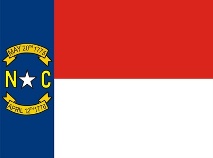 Motorists in the Tar Heel State have many choices and options when looking to get insured and choosing the right auto insurance policy can be the difference in becoming adequately protected or having to pay for accident related expenses out of pocket. Aside from the state mandated minimum coverage, consumers also need to determine whether more protection would be beneficial and see if it can be afforded. Currently, all motorists are required to carry liability coverage with limits of $30,000 for bodily injury for one person, $60,000 for bodily injury per accident and $25,000 for property damage (commonly abbreviated as 30/60/25). Although these limits are higher than many other states it is often recommended that residents choose more protection such as 100/300/50.
Motorists in the Tar Heel State have many choices and options when looking to get insured and choosing the right auto insurance policy can be the difference in becoming adequately protected or having to pay for accident related expenses out of pocket. Aside from the state mandated minimum coverage, consumers also need to determine whether more protection would be beneficial and see if it can be afforded. Currently, all motorists are required to carry liability coverage with limits of $30,000 for bodily injury for one person, $60,000 for bodily injury per accident and $25,000 for property damage (commonly abbreviated as 30/60/25). Although these limits are higher than many other states it is often recommended that residents choose more protection such as 100/300/50.
According to North Carolina Motor Vehicle General Statute 20-279.21 (b)(3) and (b)(4), as of January 1, 2009 all NC car insurance policies sold or renewed must contain Uninsured/Underinsured (UM/UIM) motorist coverage. The limits must be equal to the highest bodily injury limit stated on the policy. Therefore, if there are multiple vehicles on the policy, the UM/UIM limits must match the vehicle with the most bodily injury liability. The same approach may want to be taken when purchasing this protection and the highest limit that can be afforded should be purchased. Unfortunately, due to the economic downturn, it is estimated that one in six drivers lack valid policies; this coverage can be extremely beneficial if struck and injured by such motorists or if involved in a collision with an insured who chose the minimum levels of protection and their policy cannot cover the medical expenses.
There are numerous options that a North Carolinian can choose from that are not required by law, but should be considered. One of the most common add-ons is Comprehensive and Collision coverage to cover physical damage sustained by the insured automobile; this is especially true among individuals that are financing automobiles. Generally, the finance company will require customers to maintain this protection throughout the term of the loan as part of the contract. Since the automobile is used as collateral to ensure payments will be received, the lender will require that the vehicle is covered should something happen to the vehicle. Many times if a financial institution finds out that a vehicle is not insured, they will purchase “forced-insurance” and charge it to the customer at a price that is usually much higher than if the consumer would have purchased the coverage on their own. Comprehensive and collision can also be worth the cost to individuals that own a vehicle with some value. It is often suggest to drop this protection once a car’s worth becomes less than the premium and deductible, but vehicle valued at $5,000 or more may be hard to replace at the owner’s expense; the premium may be worth paying should the vehicle get severely damaged or stolen.
Additional optional types of coverage include Medical Payments, Towing and Labor and Rental Reimbursement. Medical payments will cover necessary and reasonable expenses for medical care and funeral services up to limits purchased; this will cover the policyholder, family members and occupants of the insured vehicle. Towing and labor will pay for the cost to tow a vehicle and will also pay the fees if an insured’s keys become lost, broken or locked in an automobile. Rental reimbursement will pay for the cost to rent a replacement automobile while the policyholder’s vehicle is being repaired or while a settlement is being established for a total loss or stolen automobile; this is generally fairly cheap and can pay hundreds of dollars in rental fees following a claim. For a more in depth breakdown of coverage options, residents can also view the North Carolina Consumer Guide to Automobile Insurance which also offers tips to saving money, a description of how rates are determined and advice for high risk driver in addition to much more information.
Source: http://www.onlineautoinsurance.com/north-carolina/